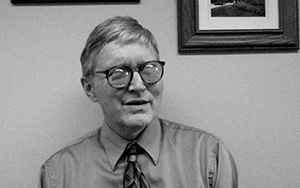 Gordon Legge received a Bachelor’s degree in Physics from MIT in 1971 and a Master’s degree in Astronomy from Harvard in 1972. In 1976, he obtained his Ph.D. in Experimental Psychology from Harvard. His dissertation dealt with the characteristics of spatial-frequency channels in human pattern vision.
Gordon Legge received a Bachelor’s degree in Physics from MIT in 1971 and a Master’s degree in Astronomy from Harvard in 1972. In 1976, he obtained his Ph.D. in Experimental Psychology from Harvard. His dissertation dealt with the characteristics of spatial-frequency channels in human pattern vision.
He then spent a postdoctoral year with Fergus Campbell at the Physiological Laboratory at Cambridge University. This was a pivotal year for him as he began a lifelong collaboration in research with colleagues including Denis Pelli and John Foley, and learned from distinguished mentors including Fergus Campbell, John Robson, Horace Barlow, Gerald Westheimer and Mathew Alpern. He learned from Fergus Campbell to care deeply about the translation of findings in basic vision research to applications for low vision.
In 1977, Legge joined the faculty of the University of Minnesota as an Assistant Professor. From 2006 to 2012, he was Chair of the Psychology Department at Minnesota. He is currently Director of the Minnesota Laboratory for Low-Vision Research and Distinguished McKnight University Professor of Psychology and Neuroscience. He is a primary founder of the University’s new Center for Applied and Translational Sensory Science (CATSS), which aims to integrate the University’s notable strengths in vision and auditory science, and to link basic and clinical research.
Low vision affects more than four million Americans and many millions of people worldwide. Gordon Legge is widely recognized and heralded for his groundbreaking application of vision science to the understanding and amelioration of the everyday problems encountered by people with low vision in reading and mobility.
One of Legge’s primary accomplishments has been to explain the role of vision in reading, including an understanding of why different eye diseases result in serious reading problems. In a seminal series of twenty journal articles under the general titlePsychophysics of Reading, he and his colleagues have discovered how key text variables (such as character size, contrast, color and font) affect reading performance and how three critical properties of vision loss impact reading—low acuity, reduced contrast sensitivity and field loss. This body of work, summarized in his 2007 book, has been widely cited and influential in both the research community and in low-vision rehabilitation. One important outcome of Legge’s work is the design of the MNREAD reading acuity chart. This instrument has become the gold standard for measuring visual reading ability. It provides measures of reading acuity, critical print size and maximum reading speed, each of which can respond differently to eye disease or therapy. MNREAD is useful in the clinic for prescribing reading aids and in research for assessing reading performance as a real-world outcome measure in clinical trials.
Legge is a member of the editorial board of Journal of Vision and previously served on the National Advisory Eye Council. He was a member of a National Research Council committee involved with the redesign of U.S. currency bills. One result of the committee’s work is the large-print numerals on the current bills, helpful to people with low vision.
Legge’s research has been recognized by an NIH MERIT award, the Lighthouse Pisart Vision Award, the 2013 Prentice medal from the American Academy of Optometry and honorary doctoral degrees from the University of Montreal and the State University of New York.
Legge credits much of his success in research to collaborations with his 20 talented Ph.D. students and many postdoctoral fellows. He is exceedingly proud of their successful careers. Many of them are making distinguished contributions to vision science including low vision.
Gordon Legge himself has low vision, a consequence of corneal scarring resulting from Stevens-Johnson syndrome at age six. His motivation and insight derive from both his personal and professional experience with vision impairment. He hopes that his accomplishments provide a role model for what is possible in science and daily life with low vision. He is particularly honored and gratified to be a recipient of the Helen Keller Prize for Vision Research. Helen Keller was a woman of enormous talent, insight and compassion and a role model for all people with disabilities.
